- Home
- Patrick E. Andrews
Crossed Arrows 3
Crossed Arrows 3 Read online
The Home of Great Western Fiction!
CONTENT
About the Book
Dedication
Excerpt from U.S. Army Regulations of 1890
Chapultepec, Mexico September 13, 1847
One
Two
Three
Four
Five
Six
Seven
Eight
Nine
Ten
Eleven
Twelve
Thirteen
Fourteen
Fifteen
Sixteen
Seventeen
Eighteen
Nineteen
Twenty
Twenty-One
Twenty-Two
Twenty-Three
Twenty-Four
Twenty-Five
Twenty-Six
Twenty-Seven
Twenty-Eight
Epilogue
Copyright
About Patrick E. Andrews
During the Mexican-American War of 1846-48, many Irish soldiers in the U.S. Army deserted to join their Catholic brothers fighting for Mexico. The Mexican Army assigned them to el Batallón de San Patricio—the Saint Patrick’s Battalion. After the American victory, the deserters were rounded up, court-martialed and shot.
Now the sons and grandsons of those Irishmen and their Mexican wives are avenging the executions by launching hit-and-run attacks across the border into Texas towns. Captain Mack Hawkins and his Kiowa-Comanche Scout Detachment are sent to the area to put a stop to the raids. The captain and his second-in-command, Lieutenant Ludlow Dooley, quickly discover that the mixture of Irish and Mexican blood produces ferocious and incredibly brave fighting men. It’s a sure bet there’ll be hell to pay before the last bullet is fired.
To the Memory of My Great-Grandfather,
Dennis McNally
Born in Dublin, Ireland 1848
Died in Tarentum, Pennsylvania 1923
Excerpt from U.S. Army Regulations of 1890
481. Indians employed as scouts will be enlisted for periods of three years and discharged when the necessity for their services shall cease. While in service they will receive the pay and allowances of cavalry soldiers and an additional allowance of 40 cents per day, provided they furnish their own horses and horse equipments.
482. Department commanders are authorized to appoint the sergeants and corporals for the whole number of enlisted scouts serving in their departments, but such appointments must not exceed the proportion of one first sergeant, five sergeants, and four corporals for every sixty enlisted Indian scouts.
483. The number of Indian scouts allowed to military departments will be announced from time to time in orders from the Headquarters of the Army.
484. The enlistment and reenlistment of Indian scouts will be made under the direction of department commanders. The appointment or mustering of farriers or blacksmiths on the rolls of Indian scouts is illegal.
485. In all cases of enlistment of Indians the full Indian name, and also the English interpretation of the same, will be inserted in the enlistment papers and all subsequent returns and reports concerning them.
CHAPULTEPEC, MEXICO
September 13, 1847
Thirty men, bound hand and foot with nooses around their necks, stood on mule carts within the sight of Chapultepec’s city citadel. Each mule was steadied by a muleteer who held tight to its bridle. At that same moment musket and cannon fire roared as the battle for the Mexican metropolis raged between the American and Mexican armies.
The condemned men’s executioner, Colonel William Harney, had been ordered to have the carts pulled out from under the prisoners the moment the United States flag appeared on the citadel roof. This would signal an American victory.
The doomed soldiers’ crimes were the same, i.e. desertion in the face of the enemy. But rather than fleeing the hell of battle, these men had gone over to the Mexican Army to fight against the Americans. They were organized into a unit designated as el Batallón de San Patricio—the Saint Patrick’s Battalion. All were Irish immigrants who had been living in the United States.
Mexican propaganda directed at them proclaimed that because they were Catholic in a mostly Protestant nation, their religion demanded that they serve the cause of Catholic Mexico. The volunteers were promised that if they deserted to the Mexican Army, they would be granted citizenship and awarded large land grants when the war ended. After enduring mistreatment by English landlords in Ireland, followed by racism and prejudice in America, the offer was too tempting for the Irish youths to ignore. Dreams of haciendas and ranchos ran through their minds; not to mention beautiful señoritas available as wives.
But now, after being captured in battle and sentenced to death, they stood on mule carts instead of vast estates.
At 9:30 a.m. the Mexican flag flying over the city suddenly fluttered, then could be seen rapidly lowering. A moment later America’s Old Glory was raised to take its place. Now the eyes of the muleteers turned to Colonel Harney. The officer raised his right hand, then swiftly dropped it to his side. The carts were pulled away, leaving the thirty men strangling in their nooses.
~*~
Five months after the mass execution, the Mexican Army was defeated and its national capital occupied by American troops. The home government was forced to face up to the unhappy fact that further resistance would be futile and hopeless. The struggle was over and they were at the mercy of the yanquis.
On September 2, 1848 the war came to an end when a treaty was signed between the United States and Mexico. The document was titled Treaty of Peace, Friendship, Limits and Settlement between the United States of America and the Mexican Republic. In it, the United States agreed to pay 15 million dollars to Mexico and settle claims of American citizens against the Mexican government of 3.25 million dollars.
In exchange, the vanquished nation agreed to allow the Rio Grande River to be the boundary between Mexico and Texas. Additionally, the United States received possession of Texas, New Mexico, Arizona, Nevada and California. Mexican citizens living in those areas could either relocate to Mexico or receive American citizenship. Not surprisingly, 90% opted to become U.S. citizens.
The treaty was ratified by the United States Senate even though there was opposition from the Whig political party who had opposed the war in the first place. This attitude was shared by many Americans.
But now, the unpopular war was over and the treaty irrevocably established.
One
Second Lieutenant Ludlow Dooley of the U.S. Kiowa-Comanche Scout Detachment had acquired a lady friend.
The object of his affection was Elizabeth Spencer the niece of Mrs. Francine Berringer who was married to Major Thomas Berringer. This gentleman was the commanding officer of the cavalry squadron stationed at Fort Lone Wolf, Indian Territory.
Beth, as Miss Spencer preferred to be called, was an eighteen-year-old petite brunette with striking blue eyes. She had been invited to leave her home in Boston for a long stay in the Berringer household out on the frontier. It was hoped that a suitable match could be made for her with a respectable young subaltern. This seemed an easy task since there were four eligible bachelor lieutenants in the squadron. These were Bradley Martin, Charles Whitmore, Steven Yardley and Ben Baldwin. All showed great promise of magnificent military careers in which they would end up at least as full colonels . If any of the young officers were lucky enough, they might even earn the rank of general with stars sparkling on their shoulder straps.
The Mrs. Major Berringer launched her campaign of matchmaking by requesting her husband to hold an officers ball in the post auditorium. This was a large building where various celebrations such as dinners, dances and o
ther social occasions were conducted. As was customary, all organization and planning for the event was done by the officers’ wives under the supervision of the Mrs. Major.
A week was spent preparing invitations, decorating the hall with patriotic bunting, and arranging for a band from Fort Sill. The Mrs. Major was certain this was the proper event for the presentation of Miss Elizabeth Spencer to squadron society, and particularly the four suitable bachelors.
However, much to the lady’s displeasure, protocol demanded that she invite all officers stationed at Fort Lone Wolf to attend the event. And that included Captain Mack Hawkins and Lieutenant Ludlow Dooley of the U.S. Scouts. She considered the two men little better than brigands with the morals and intellects of starving coyotes. But military protocol dictated that their presence was compulsory.
~*~
On the night of the big affair, Major Berringer, his wife and Beth stood at the entrance to the hall to welcome the guests. Everyone entered the building according to rank with five captains leading the way. The last of these officers was the commander of the scouts Mack Hawkins who had brought his fiancée Kristina Halverson with him. Next came the adjutant Lieutenant Ted Biltmore accompanied by his wife Eleanor, and the quartermaster Lieutenant Thomas Tripp with his spouse Roberta.
The married subalterns followed, then the bachelor lieutenants presented themselves. The Mrs. Major Berringer took a long time introducing each to Beth, praising them as fine young gentlemen with great futures in the Army.
Then Ludlow Dooley appeared.
When Beth Spencer saw the lieutenant, she was fascinated. He had a rugged look about him that suggested élan and derring-do to the young lady. This fascinating young man appeared to be the exact image of the heroes in the romantic novels she liked to read.
The Mrs. Major’s smile faded as she quickly said, “This is Lieutenant Dooley.”
Beth curtsied and smiled as Ludlow bowed slightly. “I’m pleased to make you acquaintance, Miss Spencer. Welcome to Fort Lone Wolf.”
“Thank you, Lieutenant Dooley,” Beth said. After he went into the hall, she turned to the Mrs. Major. “What does he do?”
“Oh, Beth, my dear! He is of no importance whatsoever.”
The major frowned at his wife. “My dear, Lieutenant Dooley is the only young subaltern here who has participated in battles. Like his commander Captain Hawkins he has fought outlaws, Canadian rebels and Apache Indians.”
Beth’s eyes opened wide. “Oh, my! He must be terribly brave!”
The Mrs. Major scowled. “Never mind him, my dear.”
The three went into the hall and, at a nod from the commander’s wife, the band began playing the Nightingale Waltz. Ludlow joined Hawkins and Kristina at a table in the rear of the room. There was an ongoing disagreement between the couple, but Ludlow made himself a self-appointed peacemaker and his efforts had paid off. Consequently, Hawkins ignored the rift between him and his beloved, and invited Kristina to go to the ball with him.
Kristina was deliriously happy that she and Hawkins were a couple once more. She fairly beamed at the sight of the people dancing to the music. “I think this is going to be a wonderful evening.”
Hawkins winked at Ludlow. “That was a mighty pretty girl with the major and his wife, hey?”
Ludlow grinned. “She was pretty all right!”
Kristina asked, “Are you going to dance with her, Ludlow?”
“I sure am,” he announced with conviction.
A couple of years earlier when Ludlow Dooley first reported to the scout detachment just after his graduation from West Point, he had been awkward and unsure of himself with a very low self-esteem. Most young ladies thought him “cute,” but in a rather gawky way. However, several deployments replete with gunfights in which he had killed other men had completely changed him. His appearance had matured with a self-assurance that was reflected in his eyes. This formerly awkward rookie, was now an intrepid combat veteran.
Beth Simpson had danced a waltz with Lieutenant Bradley Martin and he led her back to the table where Major and Mrs. Berringer were seated. Another of the bachelors, Lieutenant Steven Yardley was headed that way, but Ludlow beat him to the punch. He presented himself to the young lady.
“May I have the honor of the next dance, Miss Simpson?”
Beth was pleased with the request. “Of course. I recall you are Lieutenant Dooley.”
“Ludlow Dooley at your service, Miss.”
The band began a lively tune called the Dash Away Galop. Ludlow escorted Beth out on the floor, immediately leading her into the dance with panache and spirit. The girl loved it. “You’re a wonderful dancer, Lieutenant Dooley!”
“We had expert instruction in the art at West Point, Miss Simpson.”
A few minutes later when the dance ended, Ludlow was in no mood to relinquish her company. “Would you care for glass of punch, Miss Simpson?”
“I would love some, Lieutenant Dooley. Thank you so very much.”
He offered his arm and she took it for the walk over to the refreshment table. He poured them each a glass of the beverage, and they went to some chairs along the wall. Ludlow inquired, “How long are you going to be visiting Fort Lone Wolf, Miss Simpson?”
“At least until next spring,” she replied. “I love it here. The sights and sounds are ever so interesting.” She took a dainty swallow of punch. “I understand you have fought in many battles.”
“I have,” he answered. “I belong to a United States Scouts detachment. We have Indian soldiers. My commander is Captain Hawkins.”
“Oh, yes! I remember him. He is here with a beautiful blond lady.”
“Her name is Kristina Halverson. She teaches school at the Southern Kiowa-Comanche Agency east of here.”
“My! The longer I’m here the more fascinating it becomes,” Beth said. “And you say you have Indian soldiers?”
“Right. They were enlisted from the same agency where Kristina teaches.”
Ludlow took her empty cup. “I’d better return you to the Major and his wife.”
The rest of evening carried on with everyone present enjoying the music and dancing. Everyone that is, except Mrs. Major Francine Berringer. She fairly glared at Ludlow each time he presented himself to request a dance with Beth.
Captain Mack Hawkins, though not the best dancer, took Miss Kristina Halverson out on the floor each time one of the slower waltzes was played by the band. They danced no less than eight times and also partook of the punch and other refreshments on several occasions.
The Mrs. Major’s resentment of Ludlow Dooley smarted with intensified bitterness when he managed to claim the last dance of the evening with Beth.
Two
The Kiowa-Comanche Detachment had lost one of their number during the unit’s last deployment. It was a hellish mission that that took them onto the deadly Tierra Brava Desert of the Arizona Territory. Corporal Running Cougar, a Comanche, had been killed during an attack on the town of Hope Wells by Apache Indians. He was embalmed by the town’s physician and put in a coffin for the trip back to Fort Lone Wolf. After the body was turned over to his family, he was given the funeral of a Comanche warrior rather than that of a soldier of the U.S. Army.
Scout Swift Horse was promoted to the rank of corporal to take the dead man’s place. That left an opening for another scout, which meant a recruitment trip out to the Southern Kiowa-Comanche Agency. This resulted in a new enlistee by the name of Charlie Wolf. He was a twenty-year-old Comanche who was reputed to be the best antelope hunter on the reservation. Captain Hawkins and Lieutenant Dooley were impressed by his maturity as well as outdoor skills. Both agreed he would become an excellent scout.
With this administrative chore taken care of, the detachment settled back into the garrison routine. This consisted of following the directions of various bugle calls that announced drill and work details. It was all boring and predictable and as time passed, officers and scouts alike looked forward to another deployment.
But eventually an incident occurred that broke the stale routine. Captain Hawkins learned the detachment was chosen to be issued the new Krag-Jorgensen carbines newly acquired by the United States Army. These were modern bolt-action weapons designed for cavalry and field artillery units.
The new carbines arrived two weeks after the notification. Captain Edgar Mathews, the ordnance officer of the Department of the Indian Territory, showed up at Fort Lone Wolf on a mid-morning, seated beside a teamster on an army Dougherty wagon.
As soon as the vehicle pulled up in front of the scout detachment’s orderly room, Mathews jumped down and went up to the door. After two raps on the small portal, he stepped inside.
“Hello, Mack!” the ordnance officer greeted Hawkins. “And how are you, Mr. Dooley?”
“How’re you doing, Edgar?” Hawkins said. “I’m gonna make a wild guess and say you’re here with some new weapons for us.”
“Give the man a cigar!” Mathews exclaimed. “As a matter of fact I have a crate of a dozen Krag-Jorgensen carbines and another filled with ammunition.”
The three officers went outside to the wagon and waited while the teamster opened the crate of carbines. He handed one down to Mathews, who passed it over to Hawkins. Hawkins hefted it and brought it up to his shoulder, aiming at a crow perched on the chimney of the nearby ordnance storehouse.
“Nice balance,” the detachment commander said. He passed it over to Ludlow.
Ludlow was also appreciative of the carbine. He worked the bolt, opening and closing it several times. Then he also took aim at the inoffensive crow, who suddenly noticed the attention and flew off with loud caws of protest.
Mathews spoke up saying, “Let’s take it inside and I’ll acquaint you fellows with a fine brand new weapon. I’m certain you’re gonna take a strong liking to this beauty.”

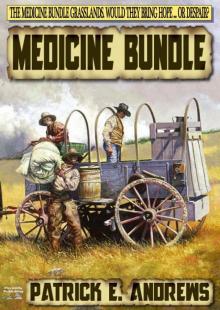 Medicine Bundle
Medicine Bundle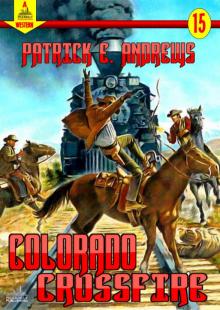 Colorado Crossfire
Colorado Crossfire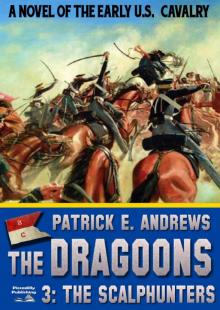 The Dragoons 3
The Dragoons 3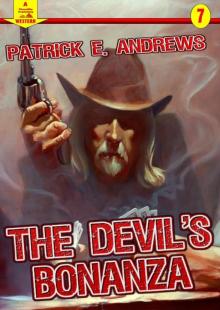 The Devil's Bonanza (A Piccadilly Publishing Western Book
The Devil's Bonanza (A Piccadilly Publishing Western Book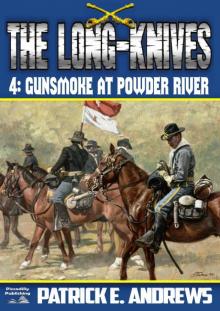 Gunsmoke at Powder River (The Long-Knives #4)
Gunsmoke at Powder River (The Long-Knives #4)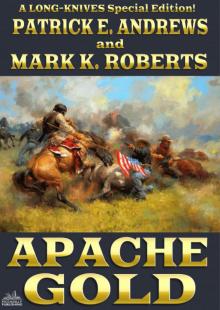 The Long-Knives 6
The Long-Knives 6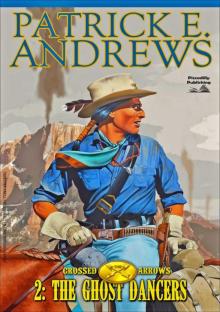 The Ghost Dancers (A Crossed Arrows Western Book 2)
The Ghost Dancers (A Crossed Arrows Western Book 2)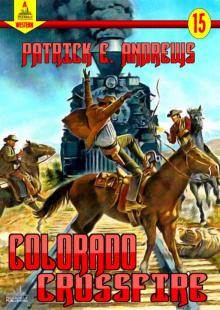 Colorado Crossfire (A Piccadilly Pulishing Western Book 15)
Colorado Crossfire (A Piccadilly Pulishing Western Book 15)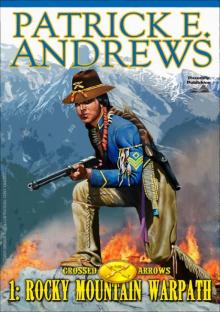 Rocky Mountain Warpath (A Crossed Arrows Western Book 1)
Rocky Mountain Warpath (A Crossed Arrows Western Book 1)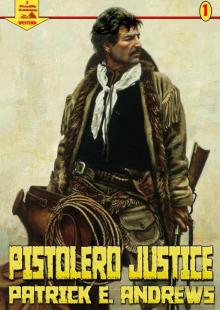 Pistolero Justice (A Piccadilly Publishing Western
Pistolero Justice (A Piccadilly Publishing Western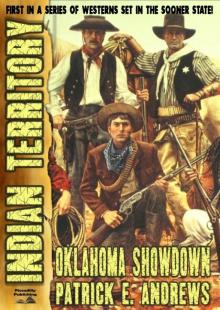 Oklahoma Showdown (An Indian Territory Western Book 1)
Oklahoma Showdown (An Indian Territory Western Book 1)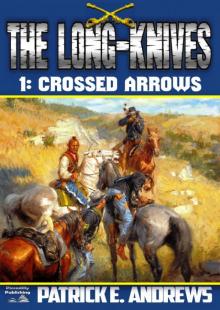 Crossed Arrows (A Long-Knives Western Book 1)
Crossed Arrows (A Long-Knives Western Book 1)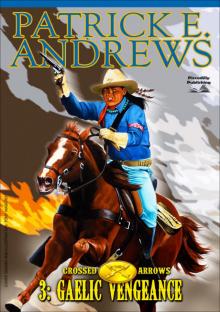 Crossed Arrows 3
Crossed Arrows 3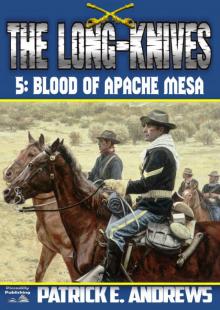 Blood of Apache Mesa
Blood of Apache Mesa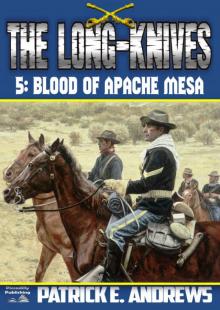 The Long-Knives 5
The Long-Knives 5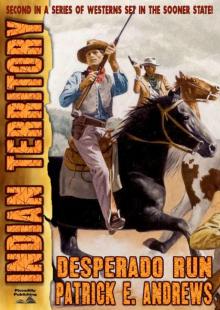 Desperado Run (An Indian Territory Western Book 2)
Desperado Run (An Indian Territory Western Book 2)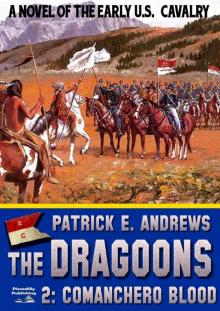 Comanchero Blood (A Dragoons Western Book 2)
Comanchero Blood (A Dragoons Western Book 2)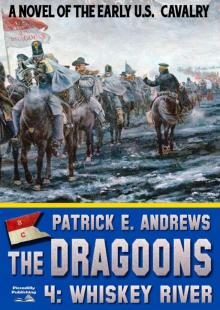 The Dragoons 4
The Dragoons 4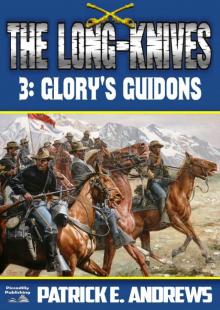 Glory's Guidons (The Long-Knives US Cavalry Western Book 3)
Glory's Guidons (The Long-Knives US Cavalry Western Book 3)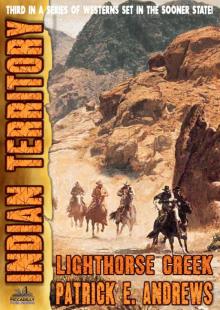 Indian Territory 3
Indian Territory 3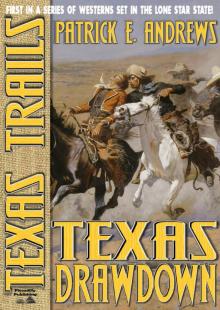 Texas Trails 1
Texas Trails 1